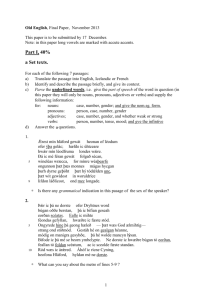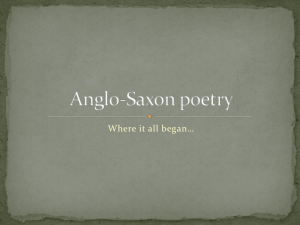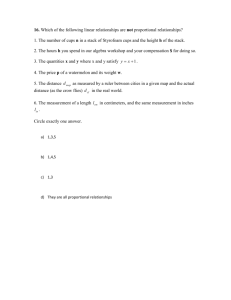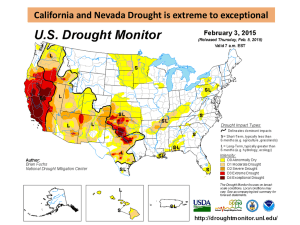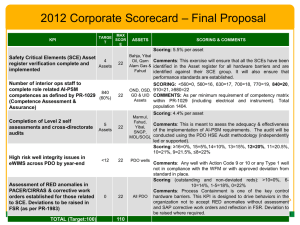A Selection of Texts for the History of English
advertisement
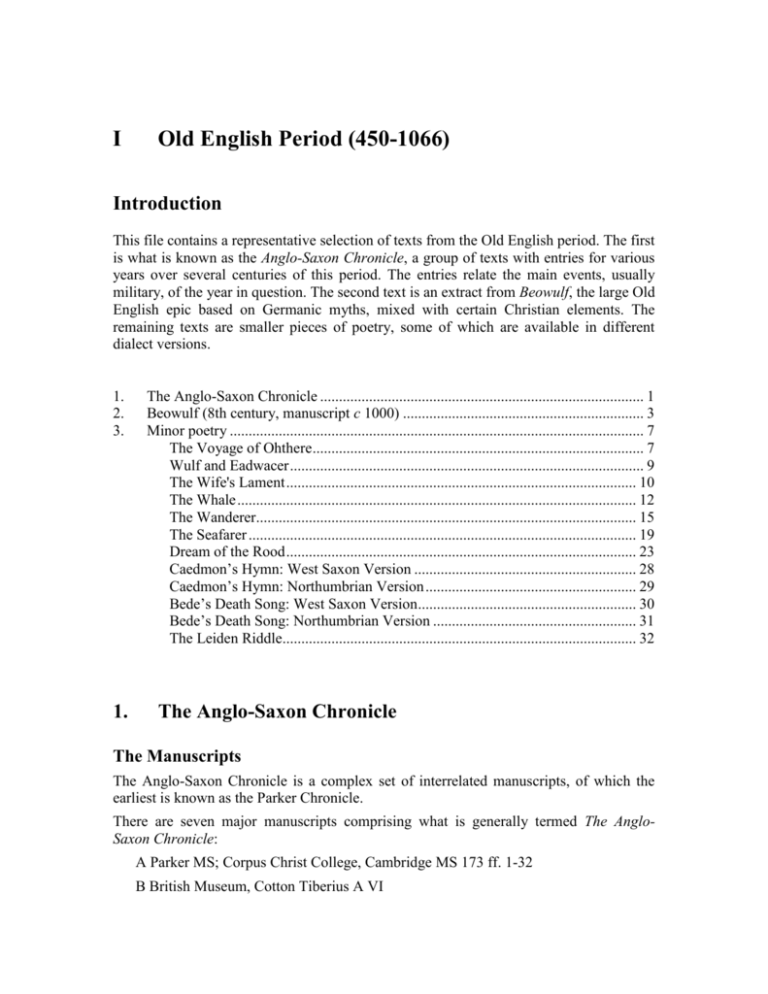
I Old English Period (450-1066) Introduction This file contains a representative selection of texts from the Old English period. The first is what is known as the Anglo-Saxon Chronicle, a group of texts with entries for various years over several centuries of this period. The entries relate the main events, usually military, of the year in question. The second text is an extract from Beowulf, the large Old English epic based on Germanic myths, mixed with certain Christian elements. The remaining texts are smaller pieces of poetry, some of which are available in different dialect versions. 1. 2. 3. 1. The Anglo-Saxon Chronicle ...................................................................................... 1 Beowulf (8th century, manuscript c 1000) ................................................................ 3 Minor poetry .............................................................................................................. 7 The Voyage of Ohthere ........................................................................................ 7 Wulf and Eadwacer .............................................................................................. 9 The Wife's Lament ............................................................................................. 10 The Whale .......................................................................................................... 12 The Wanderer..................................................................................................... 15 The Seafarer ....................................................................................................... 19 Dream of the Rood ............................................................................................. 23 Caedmon’s Hymn: West Saxon Version ........................................................... 28 Caedmon’s Hymn: Northumbrian Version ........................................................ 29 Bede’s Death Song: West Saxon Version .......................................................... 30 Bede’s Death Song: Northumbrian Version ...................................................... 31 The Leiden Riddle.............................................................................................. 32 The Anglo-Saxon Chronicle The Manuscripts The Anglo-Saxon Chronicle is a complex set of interrelated manuscripts, of which the earliest is known as the Parker Chronicle. There are seven major manuscripts comprising what is generally termed The AngloSaxon Chronicle: A Parker MS; Corpus Christ College, Cambridge MS 173 ff. 1-32 B British Museum, Cotton Tiberius A VI C British Museum, Cotton Tiberius B I D British Museum, Cotton Tiberius B IV E Laud MS; Bodlean MS, Laud 636 F British Museum, Cotton Domitian A VIII G British Museum, Cotton Otho B XI It is believed that the history of these documents is roughly as follows. Sometime in the 9th century a chronicle was drawn up in Wessex. Some of the sources used to compile this chronicle have been identified: Bede's Historia Ecclesiastica, and its chronological summary; A continuation of this summary down to Ecgbryht (Egbert); Northumbrian and Mercian genealogical lists; etc. Other (non-extant) sources have been suggested for other material in the chronicles, for example an earlier set of West Saxon annals down to 754 have been postulated to account for the relative frequency of West Saxon references to this point. There are very few (5) entries between 755 and 823 that refer specifically to Wessex, and these are thought to come from an oral tradition. After 823 the material is contemporary with the compilation. The date when this original (non-extant) chronicle was compiled is uncertain, but it is thought that there was a chronicle up to 855, as the genealogy for Æthelwulf in 855 look like a termination. Copies of this chronicle were then copied to become the various extant manuscripts roughly as follows. The first part of the Parker MS (MS A) was probably written in 891 (where the first hand finishes), this was then continued to 1093. MS G (almost completely destroyed by fire in 1731) is an 11th century transcript of MS A probably made at Winchester. Interestingly, all the evidence for the growth and alteration of MS A has been ironed out in MS G so if only this had survived we would have little idea of the underlying complexity of the transmission of these chronicles. II. A lost chronicle similar to MS A, sent possibly to Abingdon was copied to form: MS B; copied around 1000, and not continued MS C; copied in the mid 11th century and continued to 1066. A copy of the original chronicle was sent to the North where it was expanded with material from Bede and other northern sources and continued with northern material. MS D is a mid-11th century copy of this which was then continued to 1179. A chronicle similar to the northern ancestor to MS D was compiled and sent to Canterbury where it was kept until after 1066. MS E (the Laud manuscript) was copied from this in 1122 and continued to 1154. MS F is another bilingual (Latin and OE) copy of this Canterbury chronicle. The following extract deals with the events surrounding the coming of the Germanic tribes to Britain. Anno 449. Her Martianus and Valentinus onfengon rice, and ricsodon seofon winter. And on hiera dagum Hengest and Horsa, fram Wyrtgeorne gelaþode, Bretta cyninge, gesohton Bretene on þæm stede þe is genemned Ypwines-fleot, ærest Brettum to fultume, ac hie eft on hie fuhton. Se cyning het hie feohtan ongean Peohtas; and hie swa dydon, and sige hæfdon swa hwær swa hie comon. Hie þa sendon to Angle, and heton him sendan maran fultum. Þa sendon hie him maran fultum. þa comon þa menn of þrim mægþum Germanie: of Ealdseaxum, of Englum, of Iotum. Anno 455. Her Hengest and Horsa fuhton wiþ Wyrtgeorne þæm cyninge in þære stowe þe is genemned Æglesþrep; and his broþor Horsan man ofslog. And æfter þæm Hengest feng to rice, and Æsc his sunu. Anno 457. Her Hengest and Æsc fuhton wiþ Brettas in þære stowe þe is genemned Crecganford, and þær ofslogon feower þusend wera. þa forleton þa Brettas Centland, and mid micle ege flugon to Lundenbyrig. 2. Anno 449. In this year [lit here] Martianus and Valentinus succeeded to [lit received] kingship, and ruled seven years. And in their days Hengest and Horsa, invited by Vortigern, king of [the] Britons, came to Britain at the place which is called Ebbsfleet, first as a help to [the] Britons, but they afterwards fought against them. The king commanded them to fight against [the] Picts; and they did so, and had victory wherever they came. Then they sent to Angeln, and told them to send more help. They then sent to them more help. Then the men came from three tribes in Germany: from [the] Old Saxons, from [the] Angles, from [the] Jutes. 455. In this year Hengest and Horsa fought against Vortigern the king in the place which is called Aylesford; and his brother Horsa was slain [lit one slew his brother Horsa]. And after that Hengest and Æsc his son succeeded to kingship [lit Hengest succeeded to kingship, and Æsc his son]. 457. In this year Hengest and Æsc fought against [the] Britons in the place which is called Crayford, and there slew four thousand men [lit of men]. The Britons then abandoned Kent, and with great fear fled to London. Beowulf (8th century, manuscript c 1000) Hwæt! We Gardena in geardagum, þeodcyninga, þrym gefrunon, hu ða æþelingas ellen fremedon. Oft Scyld Scefing sceaþena þreatum, 5 monegum mægþum, meodosetla ofteah, egsode eorlas. Syððan ærest wearð feasceaft funden, he þæs frofre gebad, weox under wolcnum, weorðmyndum þah, oðþæt him æghwylc þara ymbsittendra 10 ofer hronrade hyran scolde, gomban gyldan. þæt wæs god cyning! ðæm eafera wæs æfter cenned, geong in geardum, þone god sende folce to frofre; fyrenðearfe ongeat 15 þe hie ær drugon aldorlease lange hwile. Him þæs liffrea, wuldres wealdend, woroldare forgeaf; Beowulf wæs breme (blæd wide sprang), Scyldes eafera Scedelandum in. 20 Swa sceal geong guma gode gewyrcean, fromum feohgiftum on fæder bearme, þæt hine on ylde eft gewunigen wilgesiþas, þonne wig cume, leode gelæsten; lofdædum sceal 25 in mægþa gehwære man geþeon. Him ða Scyld gewat to gescæphwile felahror feran on frean wære. Hi hyne þa ætbæron to brimes faroðe, swæse gesiþas, swa he selfa bæd, 30 þenden wordum weold wine Scyldinga; leof landfruma lange ahte. þær æt hyðe stod hringedstefna, isig ond utfus, æþelinges fær. Aledon þa leofne þeoden, 35 beaga bryttan, on bearm scipes, mærne be mæste. þær wæs madma fela of feorwegum, frætwa, gelæded; ne hyrde ic cymlicor ceol gegyrwan hildewæpnum ond heaðowædum, 40 billum ond byrnum; him on bearme læg madma mænigo, þa him mid scoldon on flodes æht feor gewitan. Nalæs hi hine læssan lacum teodan, þeodgestreonum, þon þa dydon 45 þe hine æt frumsceafte forð onsendon ænne ofer yðe umborwesende. þa gyt hie him asetton segen geldenne heah ofer heafod, leton holm beran, geafon on garsecg; him wæs geomor sefa, 50 murnende mod. Men ne cunnon secgan to soðe, selerædende, hæleð under heofenum, hwa þæm hlæste onfeng. ða wæs on burgum Beowulf Scyldinga, leof leodcyning, longe þrage 55 folcum gefræge (fæder ellor hwearf, aldor of earde), oþþæt him eft onwoc heah Healfdene; heold þenden lifde, gamol ond guðreouw, glæde Scyldingas. ðæm feower bearn forð gerimed 60 in worold wocun, weoroda ræswan, Heorogar ond Hroðgar ond Halga til; hyrde ic þæt wæs Onelan cwen, Heaðoscilfingas healsgebedda. þa wæs Hroðgare heresped gyfen, 65 wiges weorðmynd, þæt him his winemagas georne hyrdon, oðð þæt seo geogoð geweox, magodriht micel. Him on mod bearn þæt healreced hatan wolde, medoærn micel, men gewyrcean 70 þonne yldo bearn æfre gefrunon, ond þær on innan eall gedælan geongum ond ealdum, swylc him god sealde, buton folcscare ond feorum gumena. ða ic wide gefrægn weorc gebannan 75 manigre mægþe geond þisne middangeard, folcstede frætwan. Him on fyrste gelomp, ædre mid yldum, þæt hit wearð ealgearo, healærna mæst; scop him Heort naman se þe his wordes geweald wide hæfde. 80 He beot ne aleh, beagas dælde, sinc æt symle. Sele hlifade, heah ond horngeap, heaðowylma bad, laðan liges; ne wæs hit lenge þa gen þæt se ecghete aþumsweorum 85 æfter wælniðe wæcnan scolde. ða se ellengæst earfoðlice þrage geþolode, se þe in þystrum bad, þæt he dogora gehwam dream gehyrde hludne in healle; þær wæs hearpan sweg, 90 swutol sang scopes. Sægde se þe cuþe frumsceaft fira feorran reccan, cwæð þæt se ælmihtiga eorðan worhte, wlitebeorhtne wang, swa wæter bebugeð, gesette sigehreþig sunnan ond monan 95 leoman to leohte landbuendum ond gefrætwade foldan sceatas leomum ond leafum, lif eac gesceop cynna gehwylcum þara ðe cwice hwyrfaþ. Swa ða drihtguman dreamum lifdon 100 eadiglice, oððæt an ongan fyrene fremman feond on helle. Wæs se grimma gæst Grendel haten, mære mearcstapa, se þe moras heold, fen ond fæsten; fifelcynnes eard 105 wonsæli wer weardode hwile, siþðan him scyppend forscrifen hæfde in Caines cynne. þone cwealm gewræc ece drihten, þæs þe he Abel slog; ne gefeah he þære fæhðe, ac he hine feor forwræc, 110 metod for þy mane, mancynne fram. þanon untydras ealle onwocon, eotenas ond ylfe ond orcneas, swylce gigantas, þa wið gode wunnon lange þrage; he him ðæs lean forgeald. 3. Minor poetry The Voyage of Ohthere 1 Ohthere sæde his hlaforde, Ælfrede cyninge, Othere said to his lord, King Alfred, that he þæt he ealra Norðmonna norþmest bude. lived northernmost of all the Northmen (or Norwegians). 2 He cwæþ þæt he bude on þæm lande norþweardum wiþ þa Westsæ. He said that he lived in the land [that is] northward along the Western Sea (i.e. the sea to the west of Norway). 3 He sæde þeah þæt þæt land sie swiþe lang norþ þonan; He said, however, that the land is [i.e. extends] very long to the north from there. 4 Ac hit is eal weste, buton on feawum stowum But it is all waste, except that Sámi people styccemælum wiciaþ Finnas, on huntoþe on camp out in a few places here and there—by wintra, and on sumera on fiscaþe be þære sæ. hunting in winter and fishing in summer along the sea. 6 He sæde þæt he æt sumum cirre wolde He said that one time [lit. "on a certain fandian hu longe þæt land norþryhte læge, oþþe occasion"] he wanted to find out how long the hwæþer ænig mon be norþan þæm westenne land extended to the north, or whether any man bude. lived north of the wasteland. 9 Þa for he norþryhte be þæm lande. Then he travelled northwards along the land. Let him ealne weg þæt weste land on þæt steorbord, ond þa widsæ on þæt bæcbord þrie dagas. All the way he kept the wasteland on his starboard [i.e. to his right], and the open sea on his port side [left] for three days. 11 Þa wæs he swa feor norþ swa þa hwælhuntan firrest faraþ. Then he was as far north as the whalehunters ever [lit. farthest] travel. 12 Þa for he þa giet norþryhte swa feor swa he Then he travelled north still as far as he could meahte on þæm oþrum þrim dagum gesiglan. sail in the next three days. 13 Þa beag þæt land þær eastryhte, oþþe seo sæ Then the land turned eastward there, or the sea in on þæt lond, he nysse hwæþer, buton he wisse þæt he þær bad westan windes ond hwon norþan, ond siglde þa east be lande swa swa he meahte on feower dagum gesiglan. [turned] into the land, he did not know which, but he knew that he waited there for a wind from the west and a little from the north, and then sailed east along the land as far as he could sail in four days. 17 Þa sceolde he þær bidan ryhtnorþanwindes, Then he had to wait for a wind directly from for þæm þæt land beag þær suþryhte, oþþe seo the north, because the land turned southward sæ in on þæt land, he nysse hwæþer. there, or the sea into the land, he did not know which. 19 Þa siglde he þonan suþryhte be lande swa swa he mehte on fif dagum gesiglan. Then he sailed from there due south along the land as much as he could sail in five days. 20 Þa læg þær an micel ea up in on þæt land. Then a great river extended there up into that land. 21 Þa cirdon hie up in on þa ea, for þæm hie ne dorston forþ bi þære ea siglan for unfriþe; for þæm þæt land wæs eall gebun on oþre healfe þære eas. Then they turned up into the river, because they dared not sail forward across the river because of [fear of] hostilities, because the land was all settled on the other side of the river. 23 Ne mette he ær nan gebun land, siþþan he He had not previously encountered any settled from his agnum ham for; ac him wæs ealne wegland since he travelled from his own home; but weste land on þæt steorbord, butan fiscerum all the way there was waste land on his and fugelerum ond huntum, ond þæt wæron eall starboard, except for fishers and fowlers and Finnas; ond him wæs a widsæ on þæt bæcbord. hunters, and that was all Sámi; and open sea was always on his port side. 27 Þa Beormas hæfdon swiþe wel gebun hira land: ac hie ne dorston þæron cuman. The Biarmians had settled their land very well: but they dared not enter therein. 28 Ac þara Terfinna land wæs eal weste, buton But the land of the Sámi was all waste, except þær huntan gewicodon, oþþe fisceras, oþþe where hunters camped, or fishermen, or fugeleras. fowlers. Wulf and Eadwacer Verse Indeterminate Saxon Leodum is minum swylce him mon lac gife; willað hy hine aþecgan, gif he on þreat cymeð. Ungelic is us. Wulf is on iege, ic on oþerre. 5 Fæst is þæt eglond, fenne biworpen. Sindon wælreowe weras þær on ige; willað hy hine aþecgan, gif he on þreat cymeð. Ungelice is us. Wulfes ic mines widlastum wenum dogode; 10 þonne hit wæs renig weder ond ic reotugu sæt, þonne mec se beaducafa bogum bilegde, wæs me wyn to þon, wæs me hwæþre eac lað. Wulf, min Wulf, wena me þine seoce gedydon, þine seldcymas, 15 murnende mod, nales meteliste. Gehyrest þu, Eadwacer? Uncerne earne hwelp bireð wulf to wuda. þæt mon eaþe tosliteð þætte næfre gesomnad wæs, uncer giedd geador. The Wife's Lament Verse Indeterminate Saxon Ic þis giedd wrece bi me ful geomorre, minre sylfre sið. Ic þæt secgan mæg, hwæt ic yrmþa gebad, siþþan ic up weox, niwes oþþe ealdes, no ma þonne nu. 5 A ic wite wonn minra wræcsiþa. ærest min hlaford gewat heonan of leodum ofer yþa gelac; hæfde ic uhtceare hwær min leodfruma londes wære. ða ic me feran gewat folgað secan, 10 wineleas wræcca, for minre weaþearfe. Ongunnon þæt þæs monnes magas hycgan þurh dyrne geþoht, þæt hy todælden unc, þæt wit gewidost in woruldrice lifdon laðlicost, ond mec longade. 15 Het mec hlaford min herheard niman, ahte ic leofra lyt on þissum londstede, holdra freonda. Forþon is min hyge geomor, ða ic me ful gemæcne monnan funde, heardsæligne, hygegeomorne, 20 mod miþendne, morþor hycgendne. Bliþe gebæro ful oft wit beotedan þæt unc ne gedælde nemne deað ana owiht elles; eft is þæt onhworfen, is nu swa hit no wære 25 freondscipe uncer. Sceal ic feor ge neah mines felaleofan fæhðu dreogan. Heht mec mon wunian on wuda bearwe, under actreo in þam eorðscræfe. Eald is þes eorðsele, eal ic eom oflongad, 30 sindon dena dimme, duna uphea, bitre burgtunas, brerum beweaxne, wic wynna leas. Ful oft mec her wraþe begeat fromsiþ frean. Frynd sind on eorþan, leofe lifgende, leger weardiað, 35 þonne ic on uhtan ana gonge under actreo geond þas eorðscrafu. þær ic sittan mot sumorlangne dæg, þær ic wepan mæg mine wræcsiþas, earfoþa fela; forþon ic æfre ne mæg 40 þære modceare minre gerestan, ne ealles þæs longaþes þe mec on þissum life begeat. A scyle geong mon wesan geomormod, heard heortan geþoht, swylce habban sceal bliþe gebæro, eac þon breostceare, 45 sinsorgna gedreag, sy æt him sylfum gelong eal his worulde wyn, sy ful wide fah feorres folclondes, þæt min freond siteð under stanhliþe storme behrimed, wine werigmod, wætre beflowen 50 on dreorsele. Dreogeð se min wine micle modceare; he gemon to oft wynlicran wic. Wa bið þam þe sceal of langoþe leofes abidan. The Whale Verse Indeterminate Saxon Nu ic fitte gen ymb fisca cynn wille woðcræfte wordum cyþan þurh modgemynd bi þam miclan hwale. Se bið unwillum oft gemeted, 5 frecne ond ferðgrim, fareðlacendum, niþþa gehwylcum; þam is noma cenned, fyrnstreama geflotan, Fastitocalon. Is þæs hiw gelic hreofum stane, swylce worie bi wædes ofre, 10 sondbeorgum ymbseald, særyrica mæst, swa þæt wenaþ wægliþende þæt hy on ealond sum eagum wliten, ond þonne gehydað heahstefn scipu to þam unlonde oncyrrapum, 15 setlaþ sæmearas sundes æt ende, ond þonne in þæt eglond up gewitað collenferþe; ceolas stondað bi staþe fæste, streame biwunden. ðonne gewiciað werigferðe, 20 faroðlacende, frecnes ne wenað, on þam ealonde æled weccað, heahfyr ælað; hæleþ beoþ on wynnum, reonigmode, ræste geliste. þonne gefeleð facnes cræftig 25 þæt him þa ferend on fæste wuniaþ, wic weardiað wedres on luste, ðonne semninga on sealtne wæg mid þa noþe niþer gewiteþ garsecges gæst, grund geseceð, 30 ond þonne in deaðsele drence bifæsteð scipu mid scealcum. Swa bið scinna þeaw, deofla wise, þæt hi drohtende þurh dyrne meaht duguðe beswicað, ond on teosu tyhtaþ tilra dæda, 35 wemað on willan, þæt hy wraþe secen, frofre to feondum, oþþæt hy fæste ðær æt þam wærlogan wic geceosað. þonne þæt gecnaweð of cwicsusle flah feond gemah, þætte fira gehwylc 40 hæleþa cynnes on his hringe biþ fæste gefeged, he him feorgbona þurh sliþen searo siþþan weorþeð, wloncum ond heanum, þe his willan her firenum fremmað, mid þam he færinga, 45 heoloþhelme biþeaht, helle seceð, goda geasne, grundleasne wylm under mistglome, swa se micla hwæl, se þe bisenceð sæliþende eorlas ond yðmearas. He hafað oþre gecynd, 50 wæterþisa wlonc, wrætlicran gien. þonne hine on holme hungor bysgað ond þone aglæcan ætes lysteþ, ðonne se mereweard muð ontyneð, wide weleras; cymeð wynsum stenc 55 of his innoþe, þætte oþre þurh þone, sæfisca cynn, beswicen weorðaþ, swimmað sundhwate þær se sweta stenc ut gewiteð. Hi þær in farað unware weorude, oþþæt se wida ceafl 60 gefylled bið; þonne færinga ymbe þa herehuþe hlemmeð togædre grimme goman. Swa biþ gumena gehwam, se þe oftost his unwærlice on þas lænan tid lif bisceawað, 65 læteð hine beswican þurh swetne stenc, leasne willan, þæt he biþ leahtrum fah wið wuldorcyning. Him se awyrgda ongean æfter hinsiþe helle ontyneð, þam þe leaslice lices wynne 70 ofer ferhtgereaht fremedon on unræd. þonne se fæcna in þam fæstenne gebroht hafað, bealwes cræftig, æt þam edwylme þa þe him on cleofiað, gyltum gehrodene, ond ær georne his 75 in hira lifdagum larum hyrdon, þonne he þa grimman goman bihlemmeð æfter feorhcwale fæste togædre, helle hlinduru; nagon hwyrft ne swice, utsiþ æfre, þa þær in cumað, 80 þon ma þe þa fiscas faraðlacende of þæs hwæles fenge hweorfan motan. Forþon is eallinga dryhtna dryhtne, ond a deoflum wiðsace wordum ond weorcum, þæt we wuldorcyning 85 geseon moton. Uton a sibbe to him on þas hwilnan tid hælu secan, þæt we mid swa leofne in lofe motan to widan feore wuldres neotan. The Wanderer Verse Indeterminate Saxon Oft him anhaga are gebideð, metudes miltse, þeah þe he modcearig geond lagulade longe sceolde hreran mid hondum hrimcealde sæ, 5 wadan wræclastas. Wyrd bið ful aræd! Swa cwæð eardstapa, earfeþa gemyndig, wraþra wælsleahta, winemæga hryre: "Oft ic sceolde ana uhtna gehwylce mine ceare cwiþan. Nis nu cwicra nan 10 þe ic him modsefan minne durre sweotule asecgan. Ic to soþe wat þæt biþ in eorle indryhten þeaw, þæt he his ferðlocan fæste binde, healde his hordcofan, hycge swa he wille. 15 Ne mæg werig mod wyrde wiðstondan, ne se hreo hyge helpe gefremman. Forðon domgeorne dreorigne oft in hyra breostcofan bindað fæste; swa ic modsefan minne sceolde, 20 oft earmcearig, eðle bidæled, freomægum feor feterum sælan, siþþan geara iu goldwine minne hrusan heolstre biwrah, ond ic hean þonan wod wintercearig ofer waþema gebind, 25 sohte sele dreorig sinces bryttan, hwær ic feor oþþe neah findan meahte þone þe in meoduhealle min mine wisse, oþþe mec freondleasne frefran wolde, weman mid wynnum. Wat se þe cunnað, 30 hu sliþen bið sorg to geferan, þam þe him lyt hafað leofra geholena. Warað hine wræclast, nales wunden gold, ferðloca freorig, nalæs foldan blæd. Gemon he selesecgas ond sincþege, 35 hu hine on geoguðe his goldwine wenede to wiste. Wyn eal gedreas! Forþon wat se þe sceal his winedryhtnes leofes larcwidum longe forþolian, ðonne sorg ond slæp somod ætgædre 40 earmne anhogan oft gebindað. þinceð him on mode þæt he his mondryhten clyppe ond cysse, ond on cneo lecge honda ond heafod, swa he hwilum ær in geardagum giefstolas breac. 45 ðonne onwæcneð eft wineleas guma, gesihð him biforan fealwe wegas, baþian brimfuglas, brædan feþra, hreosan hrim ond snaw, hagle gemenged. þonne beoð þy hefigran heortan benne, 50 sare æfter swæsne. Sorg bið geniwad, þonne maga gemynd mod geondhweorfeð; greteð gliwstafum, georne geondsceawað secga geseldan. Swimmað eft on weg! Fleotendra ferð no þær fela bringeð 55 cuðra cwidegiedda. Cearo bið geniwad þam þe sendan sceal swiþe geneahhe ofer waþema gebind werigne sefan. Forþon ic geþencan ne mæg geond þas woruld for hwan modsefa min ne gesweorce, 60 þonne ic eorla lif eal geondþence, hu hi færlice flet ofgeafon, modge maguþegnas. Swa þes middangeard ealra dogra gehwam dreoseð ond fealleþ, forþon ne mæg weorþan wis wer, ær he age 65 wintra dæl in woruldrice. Wita sceal geþyldig, ne sceal no to hatheort ne to hrædwyrde, ne to wac wiga ne to wanhydig, ne to forht ne to fægen, ne to feohgifre ne næfre gielpes to georn, ær he geare cunne. 70 Beorn sceal gebidan, þonne he beot spriceð, oþþæt collenferð cunne gearwe hwider hreþra gehygd hweorfan wille. Ongietan sceal gleaw hæle hu gæstlic bið, þonne ealre þisse worulde wela weste stondeð, 75 swa nu missenlice geond þisne middangeard winde biwaune weallas stondaþ, hrime bihrorene, hryðge þa ederas. Woriað þa winsalo, waldend licgað dreame bidrorene, duguþ eal gecrong, 80 wlonc bi wealle. Sume wig fornom, ferede in forðwege, sumne fugel oþbær ofer heanne holm, sumne se hara wulf deaðe gedælde, sumne dreorighleor in eorðscræfe eorl gehydde. 85 Yþde swa þisne eardgeard ælda scyppend oþþæt burgwara breahtma lease eald enta geweorc idlu stodon. Se þonne þisne wealsteal wise geþohte ond þis deorce lif deope geondþenceð, 90 frod in ferðe, feor oft gemon wælsleahta worn, ond þas word acwið: "Hwær cwom mearg? Hwær cwom mago? Hwær cwom maþþumgyfa? Hwær cwom symbla gesetu? Hwær sindon seledreamas? Eala beorht bune! Eala byrnwiga! 95 Eala þeodnes þrym! Hu seo þrag gewat, genap under nihthelm, swa heo no wære. Stondeð nu on laste leofre duguþe weal wundrum heah, wyrmlicum fah. Eorlas fornoman asca þryþe, 100 wæpen wælgifru, wyrd seo mære, ond þas stanhleoþu stormas cnyssað, hrið hreosende hrusan bindeð, wintres woma, þonne won cymeð, nipeð nihtscua, norþan onsendeð 105 hreo hæglfare hæleþum on andan. Eall is earfoðlic eorþan rice, onwendeð wyrda gesceaft weoruld under heofonum. Her bið feoh læne, her bið freond læne, her bið mon læne, her bið mæg læne, 110 eal þis eorþan gesteal idel weorþeð!" Swa cwæð snottor on mode, gesæt him sundor æt rune. Til biþ se þe his treowe gehealdeþ, ne sceal næfre his torn to rycene beorn of his breostum acyþan, nemþe he ær þa bote cunne, eorl mid elne gefremman. Wel bið þam þe him are seceð, 115 frofre to fæder on heofonum, þær us eal seo fæstnung stondeð. The Seafarer Verse Indeterminate Saxon Mæg ic be me sylfum soðgied wrecan, siþas secgan, hu ic geswincdagum earfoðhwile oft þrowade, bitre breostceare gebiden hæbbe, 5 gecunnad in ceole cearselda fela, atol yþa gewealc, þær mec oft bigeat nearo nihtwaco æt nacan stefnan, þonne he be clifum cnossað. Calde geþrungen wæron mine fet, forste gebunden, 10 caldum clommum, þær þa ceare seofedun hat ymb heortan; hungor innan slat merewerges mod. þæt se mon ne wat þe him on foldan fægrost limpeð, hu ic earmcearig iscealdne sæ 15 winter wunade wræccan lastum, winemægum bidroren, bihongen hrimgicelum; hægl scurum fleag. þær ic ne gehyrde butan hlimman sæ, iscaldne wæg. Hwilum ylfete song 20 dyde ic me to gomene, ganetes hleoþor ond huilpan sweg fore hleahtor wera, mæw singende fore medodrince. Stormas þær stanclifu beotan, þær him stearn oncwæð isigfeþera; ful oft þæt earn bigeal, 25 urigfeþra; ne ænig hleomæga feasceaftig ferð frefran meahte. Forþon him gelyfeð lyt, se þe ah lifes wyn gebiden in burgum, bealosiþa hwon, wlonc ond wingal, hu ic werig oft 30 in brimlade bidan sceolde. Nap nihtscua, norþan sniwde, hrim hrusan bond, hægl feol on eorþan, corna caldast. Forþon cnyssað nu heortan geþohtas, þæt ic hean streamas, 35 sealtyþa gelac sylf cunnige; monað modes lust mæla gehwylce ferð to feran, þæt ic feor heonan elþeodigra eard gesece. Forþon nis þæs modwlonc mon ofer eorþan, 40 ne his gifena þæs god, ne in geoguþe to þæs hwæt, ne in his dædum to þæs deor, ne him his dryhten to þæs hold, þæt he a his sæfore sorge næbbe, to hwon hine dryhten gedon wille. Ne biþ him to hearpan hyge ne to hringþege, 45 ne to wife wyn ne to worulde hyht, ne ymbe owiht elles, nefne ymb yða gewealc, ac a hafað longunge se þe on lagu fundað. Bearwas blostmum nimað, byrig fægriað, wongas wlitigað, woruld onetteð; 50 ealle þa gemoniað modes fusne sefan to siþe, þam þe swa þenceð on flodwegas feor gewitan. Swylce geac monað geomran reorde, singeð sumeres weard, sorge beodeð 55 bitter in breosthord. þæt se beorn ne wat, esteadig secg, hwæt þa sume dreogað þe þa wræclastas widost lecgað. Forþon nu min hyge hweorfeð ofer hreþerlocan, min modsefa mid mereflode 60 ofer hwæles eþel hweorfeð wide, eorþan sceatas, cymeð eft to me gifre ond grædig, gielleð anfloga, hweteð on hwælweg hreþer unwearnum ofer holma gelagu. Forþon me hatran sind 65 dryhtnes dreamas þonne þis deade lif, læne on londe. Ic gelyfe no þæt him eorðwelan ece stondað. Simle þreora sum þinga gehwylce, ær his tid aga, to tweon weorþeð; 70 adl oþþe yldo oþþe ecghete fægum fromweardum feorh oðþringeð. Forþon þæt bið eorla gehwam æftercweþendra lof lifgendra lastworda betst, þæt he gewyrce, ær he on weg scyle, 75 fremum on foldan wið feonda niþ, deorum dædum deofle togeanes, þæt hine ælda bearn æfter hergen, ond his lof siþþan lifge mid englum awa to ealdre, ecan lifes blæd, 80 dream mid dugeþum. Dagas sind gewitene, ealle onmedlan eorþan rices; næron nu cyningas ne caseras ne goldgiefan swylce iu wæron, þonne hi mæst mid him mærþa gefremedon 85 ond on dryhtlicestum dome lifdon. Gedroren is þeos duguð eal, dreamas sind gewitene, wuniað þa wacran ond þas woruld healdaþ, brucað þurh bisgo. Blæd is gehnæged, eorþan indryhto ealdað ond searað, 90 swa nu monna gehwylc geond middangeard. Yldo him on fareð, onsyn blacað, gomelfeax gnornað, wat his iuwine, æþelinga bearn, eorþan forgiefene. Ne mæg him þonne se flæschoma, þonne him þæt feorg losað, 95 ne swete forswelgan ne sar gefelan, ne hond onhreran ne mid hyge þencan. þeah þe græf wille golde stregan broþor his geborenum, byrgan be deadum, maþmum mislicum þæt hine mid wille, 100 ne mæg þære sawle þe biþ synna ful gold to geoce for godes egsan, þonne he hit ær hydeð þenden he her leofað. Micel biþ se meotudes egsa, forþon hi seo molde oncyrreð; se gestaþelade stiþe grundas, 105 eorþan sceatas ond uprodor. Dol biþ se þe him his dryhten ne ondrædeþ; cymeð him se deað unþinged. Eadig bið se þe eaþmod leofaþ; cymeð him seo ar of heofonum, meotod him þæt mod gestaþelað, forþon he in his meahte gelyfeð. Stieran mon sceal strongum mode, ond þæt on staþelum healdan, 110 ond gewis werum, wisum clæne, scyle monna gehwylc mid gemete healdan wiþ leofne ond wið laþne bealo, þeah þe he hine wille fyres fulne oþþe on bæle forbærnedne 115 his geworhtne wine. Wyrd biþ swiþre, meotud meahtigra þonne ænges monnes gehygd. Uton we hycgan hwær we ham agen, ond þonne geþencan hu we þider cumen, ond we þonne eac tilien, þæt we to moten 120 in þa ecan eadignesse, þær is lif gelong in lufan dryhtnes, hyht in heofonum. þæs sy þam halgan þonc, þæt he usic geweorþade, wuldres ealdor, ece dryhten, in ealle tid. 125 Amen. Dream of the Rood Verse Indeterminate Saxon Hwæt! Ic swefna cyst secgan wylle, hwæt me gemætte to midre nihte, syðþan reordberend reste wunedon! þuhte me þæt ic gesawe syllicre treow 5 on lyft lædan, leohte bewunden, beama beorhtost. Eall þæt beacen wæs begoten mid golde. Gimmas stodon fægere æt foldan sceatum, swylce þær fife wæron uppe on þam eaxlegespanne. Beheoldon þær engel dryhtnes ealle, 10 fægere þurh forðgesceaft. Ne wæs ðær huru fracodes gealga, ac hine þær beheoldon halige gastas, men ofer moldan, ond eall þeos mære gesceaft. Syllic wæs se sigebeam, ond ic synnum fah, forwunded mid wommum. Geseah ic wuldres treow, 15 wædum geweorðode, wynnum scinan, gegyred mid golde; gimmas hæfdon bewrigene weorðlice wealdendes treow. Hwæðre ic þurh þæt gold ongytan meahte earmra ærgewin, þæt hit ærest ongan 20 swætan on þa swiðran healfe. Eall ic wæs mid sorgum gedrefed, forht ic wæs for þære fægran gesyhðe. Geseah ic þæt fuse beacen wendan wædum ond bleom; hwilum hit wæs mid wætan bestemed, beswyled mid swates gange, hwilum mid since gegyrwed. Hwæðre ic þær licgende lange hwile 25 beheold hreowcearig hælendes treow, oððæt ic gehyrde þæt hit hleoðrode. Ongan þa word sprecan wudu selesta: “þæt wæs geara iu, (ic þæt gyta geman), þæt ic wæs aheawen holtes on ende, 30 astyred of stefne minum. Genaman me ðær strange feondas, geworhton him þær to wæfersyne, heton me heora wergas hebban. Bæron me ðær beornas on eaxlum, oððæt hie me on beorg asetton, gefæstnodon me þær feondas genoge. Geseah ic þa frean mancynnes efstan elne mycle þæt he me wolde on gestigan. 35 þær ic þa ne dorste ofer dryhtnes word bugan oððe berstan, þa ic bifian geseah eorðan sceatas. Ealle ic mihte feondas gefyllan, hwæðre ic fæste stod. Ongyrede hine þa geong hæleð, (þæt wæs god ælmihtig), 40 strang ond stiðmod. Gestah he on gealgan heanne, modig on manigra gesyhðe, þa he wolde mancyn lysan. Bifode ic þa me se beorn ymbclypte. Ne dorste ic hwæðre bugan to eorðan, feallan to foldan sceatum, ac ic sceolde fæste standan. Rod wæs ic aræred. Ahof ic ricne cyning, 45 heofona hlaford, hyldan me ne dorste. þurhdrifan hi me mid deorcan næglum. On me syndon þa dolg gesiene, opene inwidhlemmas. Ne dorste ic hira nænigum sceððan. Bysmeredon hie unc butu ætgædere. Eall ic wæs mid blode bestemed, begoten of þæs guman sidan, siððan he hæfde his gast onsended. 50 Feala ic on þam beorge gebiden hæbbe wraðra wyrda. Geseah ic weruda god þearle þenian. þystro hæfdon bewrigen mid wolcnum wealdendes hræw, scirne sciman, sceadu forðeode, 55 wann under wolcnum. Weop eal gesceaft, cwiðdon cyninges fyll. Crist wæs on rode. Hwæðere þær fuse feorran cwoman to þam æðelinge. Ic þæt eall beheold. Sare ic wæs mid sorgum gedrefed, hnag ic hwæðre þam secgum to handa, 60 eaðmod elne mycle. Genamon hie þær ælmihtigne god, ahofon hine of ðam hefian wite. Forleton me þa hilderincas standan steame bedrifenne; eall ic wæs mid strælum forwundod. Aledon hie ðær limwerigne, gestodon him æt his lices heafdum, beheoldon hie ðær heofenes dryhten, ond he hine ðær hwile reste, 65 meðe æfter ðam miclan gewinne. Ongunnon him þa moldern wyrcan beornas on banan gesyhðe; curfon hie ðæt of beorhtan stane, gesetton hie ðæron sigora wealdend. Ongunnon him þa sorhleoð galan earme on þa æfentide, þa hie woldon eft siðian, meðe fram þam mæran þeodne. Reste he ðær mæte weorode. 70 Hwæðere we ðær greotende gode hwile stodon on staðole, syððan stefn up gewat hilderinca. Hræw colode, fæger feorgbold. þa us man fyllan ongan ealle to eorðan. þæt wæs egeslic wyrd! 75 Bedealf us man on deopan seaþe. Hwæðre me þær dryhtnes þegnas, freondas gefrunon, ond gyredon me golde ond seolfre. Nu ðu miht gehyran, hæleð min se leofa, þæt ic bealuwara weorc gebiden hæbbe, 80 sarra sorga. Is nu sæl cumen þæt me weorðiað wide ond side menn ofer moldan, ond eall þeos mære gesceaft, gebiddaþ him to þyssum beacne. On me bearn godes þrowode hwile. Forþan ic þrymfæst nu 85 hlifige under heofenum, ond ic hælan mæg æghwylcne anra, þara þe him bið egesa to me. Iu ic wæs geworden wita heardost, leodum laðost, ærþan ic him lifes weg rihtne gerymde, reordberendum. 90 Hwæt, me þa geweorðode wuldres ealdor ofer holmwudu, heofonrices weard! Swylce swa he his modor eac, Marian sylfe, ælmihtig god for ealle menn geweorðode ofer eall wifa cynn. 95 Nu ic þe hate, hæleð min se leofa, þæt ðu þas gesyhðe secge mannum, onwreoh wordum þæt hit is wuldres beam, se ðe ælmihtig god on þrowode for mancynnes manegum synnum 100 ond Adomes ealdgewyrhtum. Deað he þær byrigde, hwæðere eft dryhten aras mid his miclan mihte mannum to helpe. He ða on heofenas astag. Hider eft fundaþ on þysne middangeard mancynn secan 105 on domdæge dryhten sylfa, ælmihtig god, ond his englas mid, þæt he þonne wile deman, se ah domes geweald, anra gehwylcum swa he him ærur her on þyssum lænum life geearnaþ. 110 Ne mæg þær ænig unforht wesan for þam worde þe se wealdend cwyð. Frineð he for þære mænige hwær se man sie, se ðe for dryhtnes naman deaðes wolde biteres onbyrigan, swa he ær on ðam beame dyde. 115 Ac hie þonne forhtiað, ond fea þencaþ hwæt hie to Criste cweðan onginnen. Ne þearf ðær þonne ænig anforht wesan þe him ær in breostum bereð beacna selest, ac ðurh ða rode sceal rice gesecan 120 of eorðwege æghwylc sawl, seo þe mid wealdende wunian þenceð." Gebæd ic me þa to þan beame bliðe mode, elne mycle, þær ic ana wæs mæte werede. Wæs modsefa 125 afysed on forðwege, feala ealra gebad langunghwila. Is me nu lifes hyht þæt ic þone sigebeam secan mote ana oftor þonne ealle men, well weorþian. Me is willa to ðam 130 mycel on mode, ond min mundbyrd is geriht to þære rode. Nah ic ricra feala freonda on foldan, ac hie forð heonon gewiton of worulde dreamum, sohton him wuldres cyning, lifiaþ nu on heofenum mid heahfædere, 135 wuniaþ on wuldre, ond ic wene me daga gehwylce hwænne me dryhtnes rod, þe ic her on eorðan ær sceawode, on þysson lænan life gefetige ond me þonne gebringe þær is blis mycel, 140 dream on heofonum, þær is dryhtnes folc geseted to symle, þær is singal blis, ond me þonne asette þær ic syþþan mot wunian on wuldre, well mid þam halgum dreames brucan. Si me dryhten freond, 145 se ðe her on eorþan ær þrowode on þam gealgtreowe for guman synnum. He us onlysde ond us lif forgeaf, heofonlicne ham. Hiht wæs geniwad mid bledum ond mid blisse þam þe þær bryne þolodan. 150 Se sunu wæs sigorfæst on þam siðfate, mihtig ond spedig, þa he mid manigeo com, gasta weorode, on godes rice, anwealda ælmihtig, englum to blisse ond eallum ðam halgum þam þe on heofonum ær 155 wunedon on wuldre, þa heora wealdend cwom, ælmihtig god, þær his eðel wæs. Caedmon’s Hymn: West Saxon Version Verse Early Saxon Nu sculon herigean heofonrices weard, meotodes meahte and his modgeþanc, weorc wuldorfæder, swa he wundra gehwæs, ece drihten, or onstealde. 5 He ærest sceop eorðan bearnum heofon to hrofe, halig scyppend; þa middangeard moncynnes weard, ece drihten, æfter teode firum foldan, frea ælmihtig. Caedmon’s Hymn: Northumbrian Version Verse Early Anglian Nu scylun hergan hefaenricaes uard, metudæs maecti end his modgidanc, uerc uuldurfadur, sue he uundra gihuaes, eci dryctin, or astelidæ. 5 He aerist scop aelda barnum heben til hrofe, haleg scepen; tha middungeard moncynnæs uard, eci dryctin, æfter tiadæ firum foldu, frea allmectig. Bede’s Death Song: West Saxon Version Verse Early Saxon For þam nedfere næni wyrþeþ þances snotera, þonne him þearf sy to gehicgenne ær his heonengange hwæt his gaste godes oþþe yfeles 5 æfter deaþe heonon demed weorþe. Bede’s Death Song: Northumbrian Version Verse Early Anglian Fore thaem neidfaerae naenig uuiurthit thoncsnotturra, than him tharf sie to ymbhycggannae aer his hiniongae huaet his gastae godaes aeththa yflaes 5 aefter deothdaege doemid uueorthae. The Leiden Riddle Verse Early Mec se ueta uong, uundrum freorig, ob his innaðae aerest cændæ. Ni uaat ic mec biuorthæ uullan fliusum, herum ðerh hehcraeft, hygiðonc.... 5 Uundnae me ni biað ueflæ, ni ic uarp hafæ, ni ðerih ðreatun giðraec ðret me hlimmith, ne me hrutendu hrisil scelfath, ni mec ouana aam sceal cnyssa. Uyrmas mec ni auefun uyrdi craeftum, 10 ða ði geolu godueb geatum fraetuath. Uil mec huethrae suae ðeh uidæ ofaer eorðu hatan mith hæliðum hyhtlic giuæde; ni anoegun ic me aerigfaerae egsan brogum, ðeh ði n... ...n siæ niudlicae ob cocrum.
